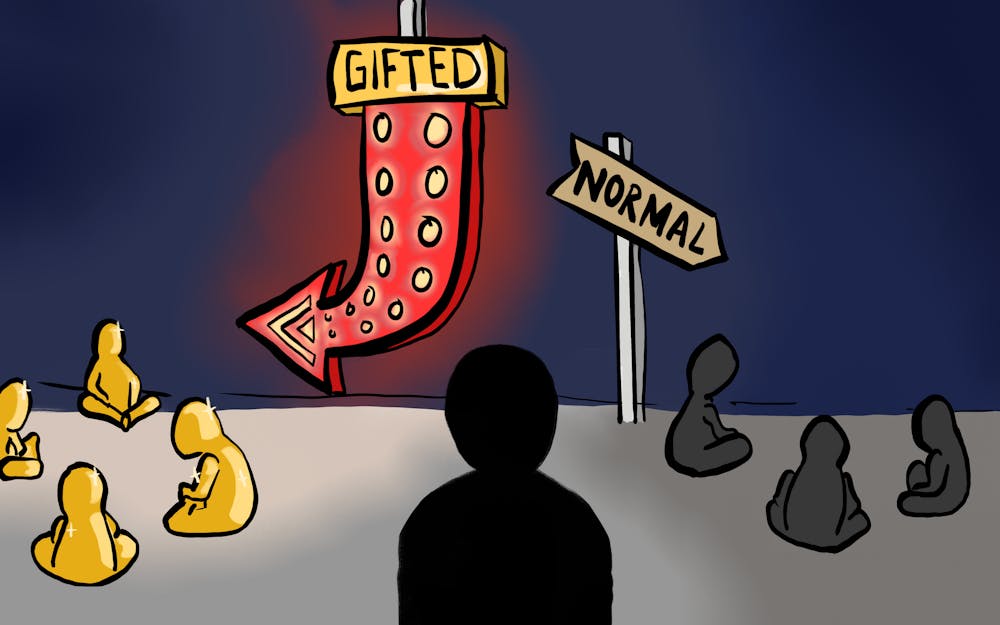Nothing gets me more than the “former gifted kid” idea that teenagers and young adults seem to constantly reference on TikTok — typically in the form of slightly self-deprecating videos that poke fun at their high expectations for their performance because they were “gifted” as children.
Unfortunately, the crushing pressure we feel to achieve arbitrary measures of success is a product of capitalism felt by nearly everyone in some way — not just those classified as gifted. Our critique of gifted programs must go beyond centering gifted kids as the victims because their advanced classification caused them to heavily rely on academic validation or to otherwise worry about being “high achieving.”
The classification system for gifted programs and their existence in the first place is not productive, accurate or equitable. Knowing that children are being classified as gifted when their ages are still in the single digits, we cannot forget those who are left behind in the wake.
Often, the only thing rendering some children gifted by school district standards is their parents’ wealth — something that cannot be separated from race. Wealthier parents have far more freedom to dedicate time or money to ensuring their child is able to learn at home, perhaps by reading to them, helping them with homework or hiring a tutor. Supplementing a child’s education is simply not a feasible reality for many parents who may face language barriers in teaching their children or who work long hours and don’t have the additional time.
Beyond this, many American children do not even have a safe and secure home to go to after school, dealing with issues like food insecurity, gun violence and homelessness. It cannot be ignored that — by no accident — the disparity in gifted classification exists along racial lines, with white children in Indiana being three times more likely to be enrolled in a gifted program than their Black peers, according to data from 2016 and 2017.
If the students placed in these programs were truly “gifted” — something I take to mean that a person has a naturally superior ability — would we then be concluding that one’s race is actually a deciding factor of our intelligence?
[Related: OPINION: Ballad of a homeschooled boy]
This implied intrinsic intelligence is often just whiteness and wealth. Elementary school students in the US whose families were classified in the top 20% of socioeconomic status were six times more likely to receive gifted services compared to their counterparts in the bottom 20%.
Why are we dedicating resources to advancing the learning and education of certain students — perhaps with more qualified teachers, smaller class sizes and more complex lesson plans — when plenty of research tells us that Black and Hispanic students already lag significantly behind white students as early as kindergarten in math and reading readiness?
This discrepancy is not explained by those students being less hardworking or smart. American history with race includes a constant effort to deny any form of dignity or achievement to various marginalized communities, especially African-Americans.
Segregation was the law less than 60 years ago, and since then our society and structures have continued in more insidious ways to bar Black people from owning property, building wealth and accessing education, among plenty of other things that we would classify as being central to the American dream.
Rather than developing and funding gifted and talented programs as they currently exist, school districts and states should be focusing on developing comprehensive and holistic special education and accessibility resources that increase the reach and resonance of school material to as many students as possible. Such programs should not separate students from a young age and exacerbate the gap in privilege that already exists.
Of course, this is not to say that education reform alone would come close to solving the inequity within our educational system, but reallocating resources to better support underprivileged students would be a start.
[Related: OPINION: Lower literacy rates – the culprit? Early screen time usage]
It is true that some children may have naturally expansive capacity to memorize things, exercise exceptional artistic ability or a strong desire to read and write, but these abilities should be nurtured and recognized in all children, regardless of race or income level. And when a problem — such as a vast disparity in the classification and academic performance of children — exists due to racial injustice and systems of inequality, those aspects cannot be ignored in developing the solution.
Leila Faraday (she/her) is a sophomore studying policy analysis with minors in geography and urban planning.






